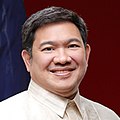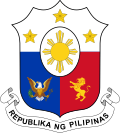| No. | Portrait | Name
(Birth–Death) | Term of office | Party | Legislature |
|---|
| Took office | Left office |
|---|
| 20 | | Francisco Sumulong
Member for Rizal–1st
(1928–2000) | July 23,
1987 | June 30,
1992 | | PDP–Laban
(until 1988) | 8th Congress |
| LDP
(from 1988) |
| 21 |  | Ronaldo Zamora
Member for San Juan–Mandaluyong
(born 1944) | July 27,
1992 | June 30,
1995 | | Lakas | 9th Congress |
| 22 | | Rodolfo Albano
Member for Isabela–1st
(1934–2019) | July 24,
1995 | June 30,
1998 | | NPC | 10th Congress |
| 23 |  | Mar Roxas
Member for Capiz–1st
(born 1957) | July 27,
1998 | January 2,
2000 | | Liberal | 11th Congress |
| 24 |  | Eduardo Gullas
Member for Cebu–1st
(1930–2025) | January 2,
2000 | November 13,
2000 | | LAMMP |
| 25 |  | Bella Angara
Member for Aurora
(born 1939) | November 13,
2000 | January 24,
2001 | | LDP |
| 26 |  | Sergio Apostol
Member for Leyte–2nd
(born 1935) | January 24,
2001 | June 30,
2001 | | Lakas |
| 27 |  | Neptali Gonzales II
Member for Mandaluyong
(born 1964) | July 23,
2001 | June 30,
2004 | | Lakas | 12th Congress |
| 28 |  | Prospero Nograles
Member for Davao City–1st
(1947–2019) | July 26,
2004 | June 30,
2007 | | Lakas | 13th Congress |
| 29 |  | Arthur Defensor Sr.
Member for Iloilo–3rd
(born 1941) | July 23,
2007 | June 30,
2010 | | Lakas | 14th Congress |
| (27) |  | Neptali Gonzales II
Member for Mandaluyong
(born 1964) | July 26,
2010 | June 30,
2016 | | Liberal | 15th Congress |
| 16th Congress |
| 30 |  | Rodolfo Fariñas
Member for Ilocos Norte–1st
(born 1951) | July 25,
2016 | July 23,
2018 | | PDP–Laban | 17th Congress |
| 31 |  | Fredenil Castro
Member for Capiz–2nd
(born 1951) | July 23,
2018 | July 30,
2018 | | NUP |
| 32 |  | Rolando Andaya Jr.
Member for Camarines Sur–1st
(1969–2022) | July 30,
2018 | January 21,
2019 | | NPC |
| (31) |  | Fredenil Castro
Member for Capiz–2nd
(born 1951) | January 21,
2019 | June 30,
2019 | | NUP |
| 33 |  | Martin Romualdez
Member for Leyte–1st
(born 1963) | July 22,
2019 | June 30,
2022 | | Lakas | 18th Congress |
| 34 |  | Mannix Dalipe
Member for Zamboanga City–2nd
(born 1973) | July 25,
2022 | June 30,
2025 | | Lakas | 19th Congress |
| 35 |  | Sandro Marcos
Member for Ilocos Norte–1st
(born 1994) | July 28,
2025 | Incumbent | | PFP | 20th Congress |




































